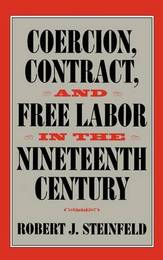
|
Coercion, Contract, and Free Labor in the Nineteenth Century
Hardback
Main Details
| Title |
Coercion, Contract, and Free Labor in the Nineteenth Century
|
| Authors and Contributors |
By (author) Robert J. Steinfeld
|
| Series | Cambridge Historical Studies in American Law and Society |
|---|
| Physical Properties |
| Format:Hardback | | Pages:342 | | Dimensions(mm): Height 229,Width 152 |
|
| Category/Genre | Labour economics |
|---|
| ISBN/Barcode |
9780521773607
|
| Classifications | Dewey:331.1172097309034 |
|---|
| Audience | | Professional & Vocational | |
|---|
| Illustrations |
3 Tables, unspecified; 2 Maps; 1 Line drawings, unspecified
|
|
Publishing Details |
| Publisher |
Cambridge University Press
|
| Imprint |
Cambridge University Press
|
| Publication Date |
12 February 2001 |
| Publication Country |
United Kingdom
|
Description
This book presents a fundamental reassessment of the nature of wage labor in the nineteenth century, focusing on the use of sanctions to enforce wage labor agreements. Professor Steinfeld argues that wage workers were not employees at will but were often bound to their employment by enforceable labor agreements, which employers used whenever available to manage their labor costs and supply. Modern free wage labor only came into being late in the nineteenth century, as a result of reform legislation that restricted the contract remedies employers could legally use.
Reviews'With his comprehensive histories of 'free' labour, Professor Robert J. Steinfeld ... unsettles the economistic equation of the market economy as a self-regulating system with individual autonomy of its citizens.' Scandinavian Economic History Review 'Much of this book is about English legal history, in the sense that it discusses the shifting views of courts about the contractual powers of employers and workers, and the arguments by which legislation was introduced and chanted ... A fascinating account is given of the shift that occurred during the mid-nineteenth century from long term contracts enforced by criminal penalties to open-ended 'minute' contracts with agreed periods of notice ... The important message today of this persuasive study is that the weakening of trade unions, and the revival of the myths of labour flexibility, may lead to the erosion of the freedom of employment contracts.' Labour History Review 'A fascinating account is given of the shift that occurred during the mid- nineteenth century from long-term contracts enforced by criminal penalties to open-ended minute' contracts with agreed periods of notice ... The important message today of this persuasive study is that the weakening of trade unions, and the revival of the myths of labour flexibility, may lead to the erosion of the freedom of employment contracts.' Labour History Review
|